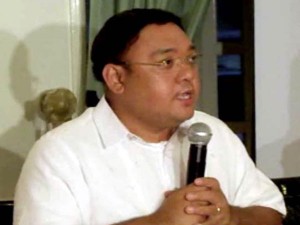MANILA, Philippines—Human rights lawyer Harry Roque and columnist Ellen Tordesillas on Friday led the filing at the Supreme Court of the fifth petition against the controversial Republic Act No. 10175 or the Cybercrime Prevention Act of 2012.
Roque, Tordesillas, Ma. Gisela Ordenes-Cascolan of the investigative outfit VERA files, lawyer and blogger Romel Bagares, radio broadcaster Alexander Adonis and lawyer Gilber Andres, legal officer of Media Defense Southeast Asia, called on the Court to declare Sections 4 (c) [4], 5, 6, 7 and 19 of the Act unconstitutional.
Named as respondents were Executive Secretary Paquito Ochoa Jr., Budget Secretary Florencio Abad, Justice Secretary Leila de Lima, Interior Secretary Manuel Roxas III, National Bureau of Investigation director Nonnatus Caesar Rojas, Philippine National Police chief Nicanor Bartolome, and acting Director-General Denis Villorente of the Information and Communications Technology Office-Department of Science and Technology.
In their 41-page petition for certiorari, the petitioners sought for a writ of prohibitory injunction and/or temporary restraining order, against the respondents to stop them from implementing the five provisions, as well as Section 27, which appropriates P500,000 annually for the implementation of the law.
“The acts of respondents, if not immediately restrained or enjoined, will cause grave and irreparable injury to [us] as journalists, taxpayers, Filipino citizens, and/or members of the legal profession, and the entire Filipino people as RA 10175 tramples on the constitutional rights such as the right to freedom of speech, of expression, and of the press, the right against double jeopardy, and right to equal protection of the laws,” the petitioners said.
They said the laws’ provision on libel was a continuing violation of the Philippines’ obligations under the International Covenant of Civil Rights after the United Nations Human Rights Council stated that libel as penalized under the Revised Penal Code was incompatible with freedom of expression and should be decriminalized.
The UNHRC issued the comment after Adonis, who was convicted of libel after being sued by former House Speaker Prospero Nograles, brought his case to the international body.
Section 4 (c) [4] of RA 10175 criminalizes libel, not only on the Internet, but also on “any other similar means which may be devised in the future.” while Section 5 identified as violations of the law the aiding or abetting in the commission of cybercrime, and any attempt in the commission of cybercrime.
The petitioners said the two provisions not only violate the freedom of speech, expression and of the press but are also “vague and overboard.”
“Because, the questioned law has no clear indicators as to who might be prosecuted for cyber libel, it runs the risk of being applied in a sweeping and arbitrary manner; for this reason it arouses the fear among citizens that anything they say or do online, especially on social networking sites, may be held to be criminal in nature; the result is the voluntary suppression of a robust public discussion on public issues,” the petitioners said.
They said Section 6, which raises by one degree higher the penalties provided for by the RPC for all crimes committed through and with the use of information and communications, violates the equal protection clause enshrined in the Charter since the increase of the penalty was “without any valid legal basis.”
Section 7, the petitioners said, violates the right against double jeopardy as it provides that apart from prosecution under the assailed law, any person charged for the alleged offense covered will not be spared from violations of the RPC and other special laws.
Section 19, which authorizes the Department of Justice to block access to computer data when such data “is prima facie found to be in violation of the provisions of this Act,” violates the principle of the separation of powers as it delegates to the DOJ what is properly a judicial function, the petitioners said.
The other petitions against the RA 10175 were filed by businessman Louis Biraogo, the Alab ng Mamamahayag party list, another group led by information technology legal expert Jose Jesus Disini, and Senator Teofisto Guingona Jr.
